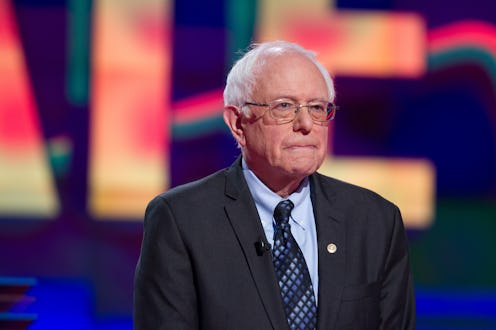During Sunday's Democratic Debate hosted in Flint, Michigan, Anderson Cooper asked Bernie Sanders about his Jewish heritage, a part of himself he rarely addresses on the campaign trail. Here's how the candidate responded:
No, I'm very proud of being Jewish. And being Jewish is so much of what I am.
Look, my father's family was wiped out by Hitler in the Holocaust. I know about what crazy and radical and extremist politics mean. I learned that lesson as a tiny, tiny child when my mother would take me shopping, and we would see people working in stores who had numbers on their arms because they were in Hitler's concentration camps.
I'm very proud of being Jewish. And that's an essential part of who I am as a human being.
Though voters aren't entitled to know absolutely everything about a candidate's personal life — usually, those tidbits simply don't translate to the person's ability to serve as president — strong personal beliefs mean something to Americans. A great number of voters highly value qualities like faith, kindness, and honesty, which are common tenets in various religions.
The problem is that a person's religion doesn't define who they are or even how they treat others. Religion requires frequent reflection and that's become more difficult to achieve as our chaotic world is injected with an increasing amount of distractions, including social media and the constant urge to remain a step ahead of everyone else. In other words, a person might go to church every Sunday, but it doesn't mean he or she practices that religion's ways after walking out of the doors and re-entering our hectic society.
Currently, America is experiencing a Republican Party that unanimously and solely prioritizes Western religion and uses it as a way to justify their socially ultra-conservative policies: banning abortion, banning gay marriage, and refusing gay rights. Bernie Sanders didn't hold off on mentioning his faith because he doesn't hold it close. Instead, it's possible that he simply wanted to avoid using it as a means to further his own political agenda.
In this political election, he wanted citizens to vote for him based on his political views, regardless of his or their own religion. And that's one of the most admirable moves we've seen yet in 2016. Furthermore, the decision to not capitalize on his Judaism is indicative of a more secular worldview that facilitates his "us, not me" dialogue.
These Twitter responses display just how touched people were by his opening up on national television. Dissenters, on the other hand, brought political leanings into the mix by accusing Sanders of not being Zionist — a label that's completely different from being Jewish.
Many Beamed With Pride
There Weren't Too Many Dissenters ...
Overwhelmingly, debate viewers tended to appreciate Sanders' heartfelt answer. Regardless of how he's chosen to approach his faith thus far in the race, he would be the first Jewish president America has ever had, if he's elected. And that's a pretty big deal.
